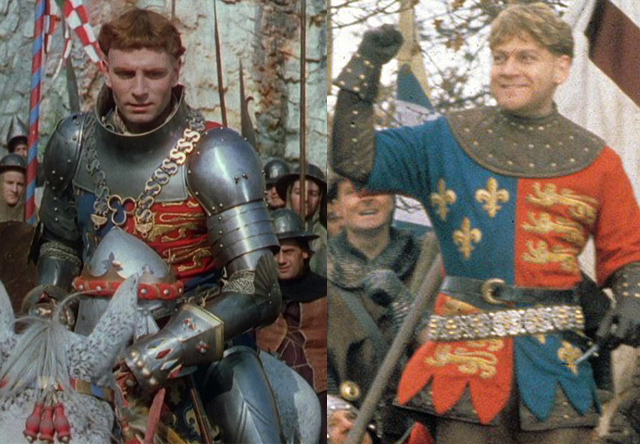
Of all the plays written by Shakespeare, the one that many believe to be the most inspiring is his historical play Henry V. Written in 1599, Henry V touches upon the life of the famed English monarch. The play itself is actually part of a tetralogy of historical plays written by Shakespeare that all combine into a singular narrative, those other plays being Richard II, Henry IV Part I and Henry IV Part II. The character of Henry V actually becomes the central character of the duo of Henry IV plays because those are less about the titular king and more about his rebellious son, Prince Hal, who will one day take his place as king. Prince Hal of course is crowned king by the end of Henry IV and the play Henry V shows us the key moment that defined his rule; the war against the French. While Shakespeare’s other historical plays were about coming of age and the makings of kings, his Henry V is very much an epic showing the glory of kingship and has long been seen as the most rousing of patriotic statements by the Bard with regards to presenting the English monarchy as a powerful force in the world. Given that his patrons were the English aristocracy, most notably Queen Elizabeth, it’s clear that Shakespeare knew his audience. But, the masses also loved Shakespeare’s take on history, as Henry V is a rousing piece of theater representing the Bard at his most bombastic. With the inspiring centerpiece of the Battle of Agincourt as the defining moment within the play, Shakespeare gives us action and suspense on the stage that is far more alive on the page than the usual Shakespearean text. To this day, Henry V remains one of Shakespeare’s most beloved and often re-staged plays, with many actors relishing the chance to take on the pivotal role of the inspiring boy king.
For many Shakespearean trained actors, the role of Henry V is an especially good one to undertake as a young performer. A lot of the great actors of the stage and screen that we know of throughout the decades have at some point played Henry V on stage. Multiple generations of actors, from Richard Burton to Timothee Chalamet have at some point donned the bowl cut and played the boy king. For many, it’s an ideal launching point to show their skill not just with the Shakespearean text, but also with their ability to command the stage or the screen. Henry V is a play about a man showing strength and courage beyond his years, and a kind of role like that demands attention from it’s audience. If the actor pulls off the role perfectly, it can be a star making performance. That’s probably the reason it’s a coveted role by so many actors. The play of course has translated to the screen a number of times, but there is little doubt that the most substantial adaptations are the ones from the two men whose film careers are inexorably linked to Shakespeare; Laurence Olivier and Kenneth Branagh. Olivier and Branagh both came into the film business pretty much in the same fashion. They began as actors in the Royal Shakespearean Theater before eventually transitioning into film acting, and then they later took their experience in film to undertake their own cinematic adaptations of Shakespeare’s plays, and in the process both fundamentally changing the ways these plays are presented on screen through their own unique styles. You can see many parallels between both Olivier’s and Branagh’s approach to Shakespeare on film, though often with focus on different plays. Olivier was more focused on Shakespeare’s more stately plays centered around kings, while Branagh often looked for more of a mix, adapting some of the Bard’s comedies like Much Ado About Nothing (1993). But they did overlap a couple times, including with Henry V, which coincidently was the movie that marked both of their film directing debuts.
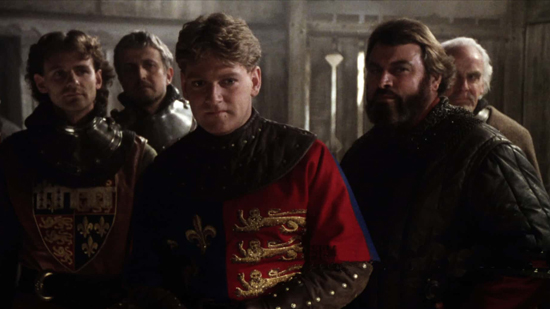
“We would not seek a battle as we are, yet as we are, we say we will not shun it.”
It is interesting to examine the differences between both Olivier and Branagh’s versions of Shakespeare’s Henry V. Despite using the same text, the approaches to the play are very different, which in many ways is reflective of the different eras that they were made in. The production of Laurence Olivier’s Henry V (1944) is significant specifically because of the era in which it was made. When Olivier returned to England after his years in Hollywood, his homeland was deeply embroiled in the midst of World War II. This was the “Keep Calm and Carry On,” moment in English history, as the nation tried it’s best to press through, even while German bomb raids became ever more frequent. It’s not any surprise that Olivier chose in this moment to bring Henry V to the big screen. Taking advantage of the play’s patriotic fervor, Olivier very much intended for his screen adaptation to be a rallying cry for his fellow countrymen; to inspire them to fight as well as they can to defend their country, much in the same way that Shakespeare’s Henry V did. Sure, it’s turning the centuries old piece of theater into wartime propaganda, but honestly isn’t that what William Shakespeare intended with his original also. Regardless, Olivier’s plan worked. The movie was an inspiring piece of cinema that was warmly received by war time audiences, many whom were also inspired to live out the example of the historical king and do what they could to fight the good fight abroad and at home. At the same time, it satisfied Olivier’s desire to adapt Shakespeare’s play onto the big screen that he felt honored the vision of Shakespeare himself. Many filmmakers before Olivier had adapted the play before on film, but they were often tied closely to how they were performed on stage. Olivier broke that mold and showed how Shakespeare could be cinematic without being unfaithful to the text. This included being creative with how shots were blocked and how the camera moved, making the whole thing less stagey. It boosted Olivier into a prosperous career behind the camera as well as in front, and inspired a whole new generation of filmmakers who would present Shakespeare in a whole new way on screen.
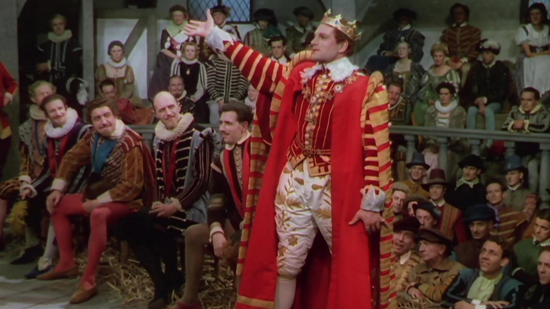
“Every subject’s duty is the king’s; but every subject’s soul is his own.”
One of those inspired filmmakers to come after Olivier of course was Kenneth Branagh. Branagh likewise chose to undertake Henry V (1989) as his directorial debut, but his approach was very different from Olivier’s; one that was far more reflective of the time in which it was made. In Olivier’s time, England was engaged in a very clear cut war where the good and bad sides were clearly drawn. In that spirit of the times, a rousing patriotic statement without contradiction is far more understandable. But, by the eighties when Branagh made his Henry V, the world was a much different place. It was the Cold War era, where the lines between good and bad were not so clear cut. In the years since Olivier’s adaptation, England went through many different political upheavals, with future generations becoming far more cynical about the idea of patriotism and national identity. In that time, the effects of the Vietnam War and smaller skirmishes like those in the Falkland Islands led many English youth to look less favorably on the power of the English empire that was in heavy decline. So, in the midst of this, Kenneth Branagh took this traditionally rousing patriotic story and deconstructs it in a way that would appeal to a more cynical audience. His Henry V is a far grittier take on the play than Olivier’s technicolor wonder. And within it, he creates a version of the character that is far more nuanced and complex. His Henry V is not the saintly monarch of past adaptations, but rather a fierce warrior that can both inspire the men around him, but also inspire fear in them as well. Branagh is far more interested in the flaws of Henry V, and wishes to make them a crucial part of his version of the story. Even with that, his adaptation is remarkably faithful to Shakespeare’s original text; almost using every word, as opposed to Olivier’s which abbreviated several parts. It’s clear upon seeing both versions of the play that both filmmakers knew the kinds of audiences they wanted to reach with their adaptations, and in both cases they achieved what they wanted. Olivier wanted to inspire, while Branagh wanted to examine.
The different approaches they took in presenting the character of Henry V through their performances reveals a lot about what they saw in the character and why it was important to re-tell the play in their own different ways. For Olivier, his approach to the part of Henry V is very much a regal one. Olivier’s style of performance is very direct and commanding. He plays Henry with the authority of a noble king, unwavering in his duty and one who commands attention in every moment. It’s the same kind of performance that Olivier honed throughout his career, whether he was doing Shakespeare or not. And it is a style of performance that is effective in his version of Henry V. The command of his voice brings out the power of Shakespeare’s words, and you can see why many war time audiences were inspired by his portrayal in the film. In contrast, Branagh’s fluctuates far more with the way he portrays the role of Henry V. Depending on the scene, Branagh’s Henry can go from fiercely growling his lines at his most angry to gently speaking his lines at his most intimate. His performance commands in the same way as Olivier’s, but while Olivier presents more the idea of a king, Branagh presents us more of a depiction of a human being. His Henry is complex, and full of a wide ranging array of emotions. It definitely is reflective of a different kind of school of acting that Olivier and Branagh come from. For Kenneth Branagh, his generation came up in a time where acting Shakespeare on film was more commonplace, so actors like him needed to find ways to make performing Shakespeare feel more natural. This is definitely evident in the ways they both perform the famous St. Crispin’s Day speech, the most famous monologue from the play, and perhaps one of the most rousing speeches ever written in the English language. Olivier delivers the speech like a great orator at a podium would; clear, commanding and easy for everyone to hear. Branagh’s version is a calming speech delivered from the heart like a passionate declaration of love, making it feel like Henry is opening himself up to the men under his command and even trying to inspire himself as he speaks to them.
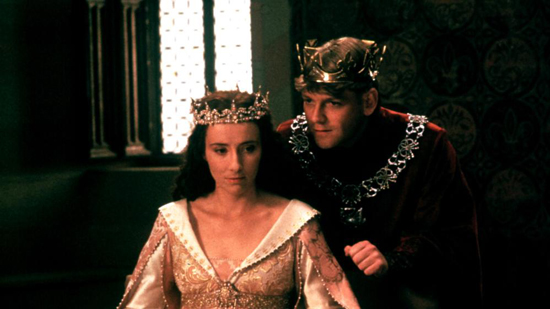
“Customs curtsy to great kings. We are the makers of manners.”
While the performances are distinctive, it can be said that both Olivier and Branagh take the same approach to adapting the play to the big screen with their direction, which is to be very creative with how they stage everything. Olivier, out of the two, surprisingly takes the more experimental approach. He starts his film with a recreation of how the play would’ve been staged in the original Globe Theater. Starting off with an amazingly well shot descent from the rooftops of Renaissance London, across the different levels of the theater, and down to the stage itself, the movie begins with a narrator asking the audience to imagine the spectacular sights that only the stage production can hint at with it’s limitations. For the first few scenes, Olivier begins the movie showing us just what the play itself would have looked like in the Globe. The subsequent scenes move us into large interior sets that feel lest like they are on the stage and more like they were constructed on a soundstage. And then once we arrive at the Battle of Agincourt scene, the movie has now moved outdoors onto a real field in the English countryside. It’s as if the further into the play we go, the movie is reflecting what the audience would’ve imagined seeing the play performed on stage. Through this clever staging, we see Olivier literally bringing a Shakespeare play to life before our eyes, blurring the lines between the stage and the screen. Branagh by contrast keeps the staging consistent throughout his adaptation, while at the same time being creative with many of the shots in his film. He dispenses with the whole stage conceit and just adapts the play straightforward like it’s a historical epic. But, at the same time, he does some daring things on film, particularly with lighting and editing. The more gritty tone is carried through in this adaptation through the visuals, with Branagh utilizing real castles as a part of his staging. Combine this with very violent recreations of the Battle of Agincourt’s skirmishes and you’ve got an adaptation that definitely de-mystifies the shiny image of the original play. Branagh’s gritty portrayal of medieval times would prove to be highly influential beyond the film, inspiring movies like Robin Hood: Prince of Thieves (1991) and Braveheart (1995) in it’s wake.
But what ultimately separates the two films is in how well it actually remains true to Shakespeare’s play. The different eras in which these plays were written again determine how well the adaptations hold up compared to what Shakespeare wrote. In that regard, Olivier’s version for the most part is a film for it’s own time for a specific purpose, while Branagh’s version is more timeless and faithful to the story and character of Henry V. That’s not to say that Laurence Olivier faulted in his adaptation. His film is a spectacular piece of cinematic art, and a film largely responsible for ushering in a whole new way of adapting Shakespeare for the big screen. But, it is clear that he was using Shakespeare’s text for a different purpose altogether. With some very noticeable omissions in the adaptation, it’s clear that Olivier wanted to present a version of Henry V that was a bit more sanitized. England needed a war time hero to inspire them, and that’s why he made his Henry much more regal and saintly. This kind of approach is understandable given that time period, but it’s a far cry from the complex character that Shakespeare put down on the page originally. In many ways, Olivier’s Henry V is contained more within a bottle of it’s own specific narrative, with the intent of making us aware of it’s purpose to present heroism in it’s purest form. Branagh by contrast brings the character of Henry V back to what he is on the page, which is a king with a complex past. It’s clear that there is an awareness of the background of Henry’s character in Branagh’s adaptation based not just on the original play itself, but from the real historical account of King Henry V, as well as the story that had been built up through the past Shakespearean plays in which Henry was the focus. Branagh demonstrates the more modern idea that leaders are not born, but rather made through adversity, and that’s why his version of Henry is flawed and yet still worthy of his sacred place within English history. His film far more seeks to get to the truth of who Henry V was rather than just make him a symbol. That’s why he’s a better fit for a more complex time in which morality and honor are not so easily defined in a world that sees things more in shades of gray.
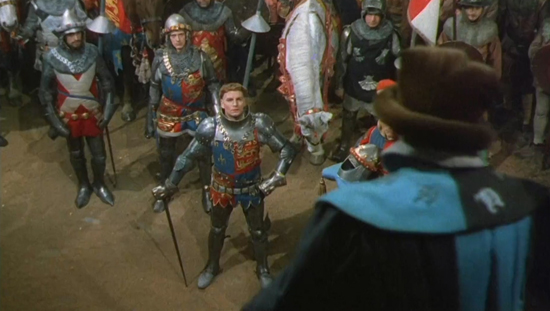
“We charge you in the name of God, take heed how you awake our sleeping sword of war.”
In either case, both Laurence Olivier and Kenneth Branagh created incredible adaptations of the same source Shakespearean play. What is most important from either version is that they show us the ideal ways to adapt Shakespeare for the big screen. Their films are not merely straight from the stage adaptations, but instead versions of Henry V that take full advantage of the language of cinema. Olivier’s version in particular is remarkably ahead of it’s time with it’s unique framing, and it showed many filmmakers thereafter exactly how to take Shakespeare’s words and make them come alive on film. Kenneth Branagh picked up the mantle set by Olivier and modernized the Bard even more with his version of Henry V, getting back to the complex character of the original text, while at the same time grounding the style in a very lived in depiction. While both actors do their best to make their heroes stand out, they are at the same time supported by other Shakespearean trained talent that likewise rise to the challenge. Branagh’s film in particular is filled with a who’s who of some of the greatest British character actors from that time, including Emma Thompson, Robbie Coltrane, Brian Blessed, Judi Dench, Derek Jacobi, and even a young Christian Bale. What is really interesting about comparing the two versions of Henry V is how the context of the times in which they were made are reflective in the presentation, even as the text itself is still eternal and true to Shakespeare’s words. Olivier’s version was a clear statement of war time resolve with the complexities of the play smoothed over, while Branagh’s version embraces the complexities and is not afraid to create a grittier version of the story for a more cynical time. Overall, I feel like Olivier’s version is more of the time capsule, looking far less timeless than Branagh’s more earthbound version. In a more complex world, Olivier’s unvarnished Henry V feels far less realistic. But, that’s not to say it’s not worth viewing. Despite it’s datedness, it’s still a great cinematic achievement and is enormously entertaining. The crown goes more to Kenneth Branagh’s more complex and interesting version of Shakespeare’s Henry V, but Laurence Olivier’s Henry is still a movie fit for a king.
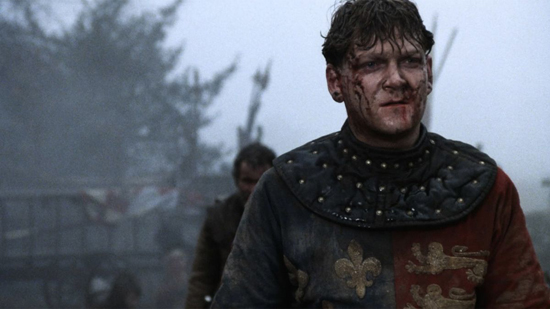
“We few, we happy few, we band of brothers. For he today who sheds his blood with me shall be my brother.”